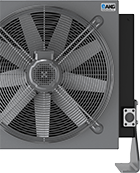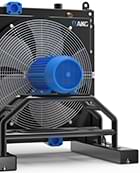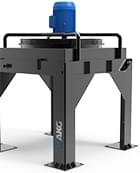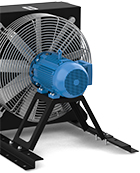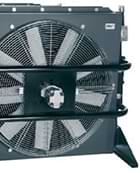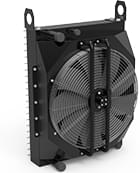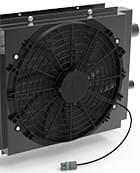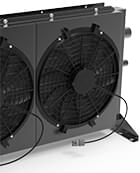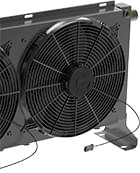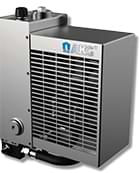AKG Coolers for On-Highway Equipment
One of the primary functions of on-highway equipment is to transport heavy and bulky construction materials, such as sand, gravel, concrete, and steel, from suppliers to construction sites. Dump trucks, for example, are used to haul large quantities of loose materials, which are vital for road construction, bridge building, and other infrastructure projects. Concrete mixer trucks play a critical role in delivering freshly mixed concrete directly to construction sites, ensuring that projects stay on schedule and within budget. Flatbed trucks are used to transport large and heavy equipment, such as excavators and bulldozers, which are essential for site preparation and earthmoving tasks.
These vehicles also support the operation and maintenance of infrastructure projects. For instance, fuel trucks and water trucks are used to supply diesel and water, respectively, to construction sites, which are necessary for the continuous operation of heavy machinery. Service trucks equipped with tools and equipment are essential for the on-site maintenance of vehicles and machinery, ensuring that operations are not interrupted by breakdowns. Tow trucks are critical for recovering disabled vehicles, preventing costly delays.
Types of On Highway Equipment that Require Hydraulic Oil Coolers
The following are just a few examples of on highway vehicles that rely on engine and hydraulic oil coolers to function at their best:
- Dump Trucks: Heat exchangers and oil coolers are used to manage this heat by maintaining optimal hydraulic fluid temperatures. They prevent the hydraulic oil from overheating, which could degrade the oilís performance and efficiency, ensuring reliable and smooth operation of the dumping mechanism.
- Concrete Mixer Trucks: These trucks have hydraulic systems that mix and pump concrete. The hydraulic system generates heat during operation due to the mechanical work required for mixing and pumping. An oil cooler is used to dissipate this heat, ensuring the hydraulic fluid remains within its optimal temperature range to prevent overheating and maintain smooth operation.
- Fuel Trucks: While primarily designed for transporting fuel, these trucks also have auxiliary systems such as hydraulic pumps and engines. The operation of these systems generates heat, which can degrade oil and fuel efficiency. Oil coolers are used to maintain the hydraulic fluid temperature within acceptable ranges, ensuring reliable operation and preventing fuel evaporation losses.
- Water Trucks: These trucks are used for dust control, which involves continuous spraying of water onto construction sites. The pumps used for spraying water generate heat, and an oil cooler is essential to manage the temperatures of the hydraulic fluid, ensuring that the pump operates smoothly and prevents overheating.
- Crane Trucks: Equipped with hydraulic cranes, these trucks lift and move heavy materials. The hydraulic system in cranes operates under high pressure and generates significant heat due to the work performed. An oil cooler is necessary to manage this heat, ensuring that the hydraulic fluid maintains proper viscosity and temperature to prevent system failures and maintain operational efficiency.
- Service Trucks: These trucks are used for on-site maintenance of heavy machinery. They often include air compressors, hydraulic pumps, and other equipment that can generate heat during use. An oil cooler helps manage the temperature of the hydraulic fluid and air compressor oil, preventing overheating and extending the life of these components.

